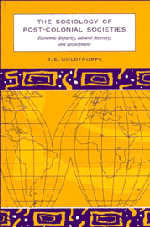Book contents
- Frontmatter
- Contents
- Preface and acknowledgements
- 1 Introduction and argument
- 2 Technology, society, and population
- 3 The colonial episode and the race question
- 4 Economic conditions
- 5 Environmental concerns
- 6 The social sciences and the ‘Third World’
- 7 The rise of towns
- 8 Family life in a changing world: two studies
- 9 Cultural diversity, language, education, and communications
- 10 Religion and development
- 11 Individual modernization: some psychological studies
- 12 Politics in post-colonial states
- 13 Aid and development
- Notes
- Index
12 - Politics in post-colonial states
Published online by Cambridge University Press: 03 May 2011
- Frontmatter
- Contents
- Preface and acknowledgements
- 1 Introduction and argument
- 2 Technology, society, and population
- 3 The colonial episode and the race question
- 4 Economic conditions
- 5 Environmental concerns
- 6 The social sciences and the ‘Third World’
- 7 The rise of towns
- 8 Family life in a changing world: two studies
- 9 Cultural diversity, language, education, and communications
- 10 Religion and development
- 11 Individual modernization: some psychological studies
- 12 Politics in post-colonial states
- 13 Aid and development
- Notes
- Index
Summary
Politics in ‘Third World’ countries is shaped by influences to some of which attention has been paid in earlier chapters, including low levels of income and low, zero, or negative rates of economic growth; the colonial heritage; cultural diversity, ethnic rivalries or conflicts, and the plural society; language, schooling, the educated elite, and the mass media of communication.
In most societies the most important power source is the state, that unique institution which according to Max Weber's classic definition successfully asserts a monopoly of legitimate force over a defined geographical area; and politics is generally thought of as being ‘about’ who controls the state and for what purposes it is used.
States are not all-powerful, and indeed a problem for many ‘Third World’ countries is that of a ‘weak’ or ‘soft’ state, not successfully asserting control of important areas of the country's life such as the military and the black-market economy. Indeed, many ‘Third World’ states hardly come up to Weber's definition by that test. But nor are states quite powerless; and the phrase ‘the autonomy of the political’ has been coined to counter reductionist explanations of politics in terms of modernization on the one hand or dependence on the other. Thus it has been argued that political structures and processes are to be seen as independent forces, operating in an area (or arena) where there are genuinely open choices among different policy options.
- Type
- Chapter
- Information
- The Sociology of Post-Colonial SocietiesEconomic Disparity, Cultural Diversity and Development, pp. 210 - 225Publisher: Cambridge University PressPrint publication year: 1996



